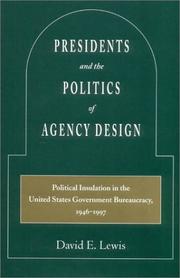| Listing 1 - 10 of 16 | << page >> |
Sort by
|
Book
ISBN: 3642282180 9786613702807 3642282199 1280792418 Year: 2012 Publisher: Heidelberg ; New York : Springer,
Abstract | Keywords | Export | Availability | Bookmark
 Loading...
Loading...Choose an application
- Reference Manager
- EndNote
- RefWorks (Direct export to RefWorks)
The organic chemists of Russia during the pre-revolutionary period counted among their number some of the most creative and talented chemists of the nineteenth and early twentieth centuries, as is attested to by the number of reactions and empirical rules bearing their names. From the founding of the Russian Academy of Sciences by Peter the Great in 1725 to the early years of the nineteenth century, Russian organic chemistry was largely in the hands of foreign scientists. The Russification of organic chemistry in Russia had begun before the middle of the nineteenth century, and reached its zenith during the last half of the same century, with vibrant schools of chemistry arising in the eastern city of Kazan', and at Moscow and St. Petersburg. By the end of the century, the Chairs of organic chemistry at universities throughout the Russian empire were occupied by Russian chemists, almost half of them trained at Kazan'. The contributions of these organic chemists encompass the structural theory of organic chemistry, empirical rules for addition and elimination, alcohol synthesis using organozinc nucleophiles, sulfoxides and sulfonium salts, and a range of redox reactions, as well as the aldol addition. The decades before the Bolshevik Revolution in 1917 saw a broadening of the chemistry developed by Russian organic chemists. In this Brief, the history of the development of organic chemistry in Russia is discussed.
Chemistry, Organic -- Charts, diagrams, etc. --- Chemistry. --- Molecular orbitals -- Charts, diagrams, etc. --- Chemistry --- Physical Sciences & Mathematics --- Biochemistry --- Chemistry, Organic --- Chemists --- History. --- Organic chemistry --- Organic chemistry. --- Organic Chemistry. --- History of Science. --- History, general. --- Chemical workers --- Physical scientists --- Chemistry, Organic. --- Annals --- Auxiliary sciences of history
Book
ISBN: 0128165200 0128157275 9780128165201 9780128157275 Year: 2019 Publisher: Amsterdam, Netherlands Elsevier
Abstract | Keywords | Export | Availability | Bookmark
 Loading...
Loading...Choose an application
- Reference Manager
- EndNote
- RefWorks (Direct export to RefWorks)
Chemical reactions. --- Wolff-Kishner reduction. --- Reactions, Chemical --- Chemical processes --- Wolff-Kishner reaction --- Reduction (Chemistry) --- Kischner, Nikolai Matwejewitsch --- Wolff, Ludwig --- Chemiker --- Neustadt an der Weinstraße --- Jena --- Friedrich-Schiller-Universität Jena --- 1857-1919 --- -24.02.1919 --- Kižner, Nikolaj Matveevič --- Kizhner, Nikolai Matveevich --- Кижнер, Николай Матвеевич --- Kishner, Nikolai --- Hochschullehrer --- Moskau --- Rossijskaja akademija nauk --- 1867-1935 --- 09.12.1867-28.11.1935

ISBN: 0804766916 1417501391 9781417501397 0804745889 0804745900 9780804745888 9780804745901 9780804766913 Year: 2003 Publisher: Stanford, Calif. Stanford University Press
Abstract | Keywords | Export | Availability | Bookmark
 Loading...
Loading...Choose an application
- Reference Manager
- EndNote
- RefWorks (Direct export to RefWorks)
The administrative state is the nexus of American policy making in the postwar period. The vague and sometimes conflicting policy mandates of Congress, the president, and courts are translated into real public policy in the bureaucracy. As the role of the national government has expanded, the national legislature and executive have increasingly delegated authority to administrative agencies to make fundamental policy decisions. How this administrative state is designed, its coherence, its responsiveness, and its efficacy determine, in Robert Dahl’s phrase, “who gets what, when, and how.” This study of agency design, thus, has implications for the study of politics in many areas. The structure of bureaucracies can determine the degree to which political actors can change the direction of agency policy. Politicians frequently attempt to lock their policy preferences into place through insulating structures that are mandated by statute or executive decree. This insulation of public bureaucracies such as the National Transportation Safety Board, the Federal Election Commission, and the National Nuclear Security Administration, is essential to understanding both administrative policy outputs and executive-legislative politics in the United States. This book explains why, when, and how political actors create administrative agencies in such a way as to insulate them from political control, particularly presidential control.
Administrative agencies --- Bureaucracy --- Presidents --- United States --- Politics and government --- Administrative agencies - United States --- Bureaucracy - United States --- Presidents - United States --- United States - Politics and government - 1945-1989 --- United States - Politics and government - 1989 --- -Administrative agencies --- #SBIB:35H1122 --- #SBIB:35H6030 --- Bestuurlijke organisatie: centrale besturen: Verenigde Staten --- Bestuur en beleid: nationale en regionale studies: Verenigde Staten

ISBN: 9786612964817 1400837685 128296481X 9781400837687 9780691133423 0691133425 9780691135441 0691135444 6612964812 9781282964815 Year: 2010 Publisher: Princeton, NJ
Abstract | Keywords | Export | Availability | Bookmark
 Loading...
Loading...Choose an application
- Reference Manager
- EndNote
- RefWorks (Direct export to RefWorks)
In the wake of Hurricane Katrina, many questioned whether the large number of political appointees in the Federal Emergency Management Agency contributed to the agency's poor handling of the catastrophe, ultimately costing hundreds of lives and causing immeasurable pain and suffering. The Politics of Presidential Appointments examines in depth how and why presidents use political appointees and how their choices impact government performance--for better or worse. One way presidents can influence the permanent bureaucracy is by filling key posts with people who are sympathetic to their policy goals. But if the president's appointees lack competence and an agency fails in its mission--as with Katrina--the president is accused of employing his friends and allies to the detriment of the public. Through case studies and cutting-edge analysis, David Lewis takes a fascinating look at presidential appointments dating back to the 1960s to learn which jobs went to appointees, which agencies were more likely to have appointees, how the use of appointees varied by administration, and how it affected agency performance. He argues that presidents politicize even when it hurts performance--and often with support from Congress--because they need agencies to be responsive to presidential direction. He shows how agency missions and personnel--and whether they line up with the president's vision--determine which agencies presidents target with appointees, and he sheds new light on the important role patronage plays in appointment decisions.
Administrative agencies --- Patronage, Political --- Presidents --- Government executives --- Executives --- Public officers --- Management. --- Selection and appointment --- United States --- Politics and government. --- Officials and employees --- Selection and appointment. --- Government --- History, Political --- Appointment, qualifications, tenure, etc. --- #SBIB:35H2130 --- #SBIB:35H6030 --- Management --- Personeelsmanagement: openbaar ambt: Verenigde Staten --- Bestuur en beleid: nationale en regionale studies: Verenigde Staten --- Public administration --- Politics and government --- Patronage [Political ] --- Government executives - Selection and appointment - United States --- Presidents - United States --- Patronage, Political - United States --- Administrative agencies - United States - Management --- United States - Officials and employees - Selection and appointment --- United States - Politics and government --- United States of America
Book
ISBN: 9780128210277 9780128210260 0128210265 0128210273 Year: 2022 Publisher: Amsterdam, Netherlands Elsevier
Abstract | Keywords | Export | Availability | Bookmark
 Loading...
Loading...Choose an application
- Reference Manager
- EndNote
- RefWorks (Direct export to RefWorks)
Addition, Elimination and Substitution: Markovnikov, Hofmann, Zaitsev and Walden: Discovery and Development discusses foundational reactions in organic chemistry and their major protagonists, contributions to synthesis, and history. Hofmann, Zaitsev, and Markovnikov are introduced, along with their major discoveries and contributions to organic chemistry. The history of controversies around Markovnikovs Rule are addressed. The book introduces Waldens original demonstration of configuration inversion, then discusses bimolecular elimination reactions, regioselective addition reactions, regiospecific alkene synthesis, and the development of modern reactions with configuration inversion.
Chemistry, Organic. --- Chemical reactions. --- Organic compounds --- Synthesis. --- Chemistry, Organic --- Chemistry, Synthetic organic --- Organic synthesis (Chemistry) --- Synthetic organic chemistry --- Reactions, Chemical --- Chemical processes --- Organic chemistry --- Chemistry --- Synthesis --- Organic Chemistry Phenomena --- History. --- history
Book
ISBN: 0128210265 0128210273 Year: 2022 Publisher: San Diego Elsevier
Abstract | Keywords | Export | Availability | Bookmark
 Loading...
Loading...Choose an application
- Reference Manager
- EndNote
- RefWorks (Direct export to RefWorks)
Digital
ISBN: 9783642282195 Year: 2012 Publisher: Berlin, Heidelberg Imprint: Springer
Abstract | Keywords | Export | Availability | Bookmark
 Loading...
Loading...Choose an application
- Reference Manager
- EndNote
- RefWorks (Direct export to RefWorks)
Pure sciences. Natural sciences (general) --- Organic chemistry --- History --- wetenschapsgeschiedenis --- organische chemie --- geschiedenis
Digital
ISBN: 9780128165201 0128165200 Year: 2019 Publisher: Amsterdam, Netherlands Elsevier
Abstract | Keywords | Export | Availability | Bookmark
 Loading...
Loading...Choose an application
- Reference Manager
- EndNote
- RefWorks (Direct export to RefWorks)
Book
Year: 1984 Publisher: Ciudad de la Habana, Cuba : Casa de las Américas,
Abstract | Keywords | Export | Availability | Bookmark
 Loading...
Loading...Choose an application
- Reference Manager
- EndNote
- RefWorks (Direct export to RefWorks)
Grenada --- Grenada --- Grenada --- Politics and government. --- Economic conditions. --- Social conditions.
Book
ISBN: 9783642282195 Year: 2012 Publisher: Berlin, Heidelberg Springer Berlin Heidelberg
Abstract | Keywords | Export | Availability | Bookmark
 Loading...
Loading...Choose an application
- Reference Manager
- EndNote
- RefWorks (Direct export to RefWorks)
The organic chemists of Russia during the pre-revolutionary period counted among their number some of the most creative and talented chemists of the nineteenth and early twentieth centuries, as is attested to by the number of reactions and empirical rules bearing their names. From the founding of the Russian Academy of Sciences by Peter the Great in 1725 to the early years of the nineteenth century, Russian organic chemistry was largely in the hands of foreign scientists. The Russification of organic chemistry in Russia had begun before the middle of the nineteenth century, and reached its zenith during the last half of the same century, with vibrant schools of chemistry arising in the eastern city of Kazan', and at Moscow and St. Petersburg. By the end of the century, the Chairs of organic chemistry at universities throughout the Russian empire were occupied by Russian chemists, almost half of them trained at Kazan'. The contributions of these organic chemists encompass the structural theory of organic chemistry, empirical rules for addition and elimination, alcohol synthesis using organozinc nucleophiles, sulfoxides and sulfonium salts, and a range of redox reactions, as well as the aldol addition. The decades before the Bolshevik Revolution in 1917 saw a broadening of the chemistry developed by Russian organic chemists. In this Brief, the history of the development of organic chemistry in Russia is discussed.
Pure sciences. Natural sciences (general) --- Organic chemistry --- History --- wetenschapsgeschiedenis --- organische chemie --- geschiedenis
| Listing 1 - 10 of 16 | << page >> |
Sort by
|

 Search
Search Feedback
Feedback About UniCat
About UniCat  Help
Help News
News